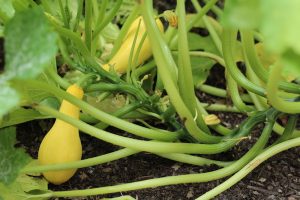A recently established garden project at the UNC Center for Health Promotion and Disease Prevention (HPDP) and other surrounding areas acts as a haven for staff and community members to relax and meditate while exemplifying HPDP’s theme of developing healthy eating habits and sustainability.

After construction of a new ABC store near the Center’s offices was complete, a group of employees noticed there was a lot of open ground that wasn’t being utilized by the store. Ziya Gizlice, the director of HPDP’s Biostatistical Services Unit, reached out to see if they could use these open grounds for their garden project. The ABC store gave consent, but UNC grounds services advised against it saying that land is not sanctioned UNC land and it could be dangerous considering it is underneath power lines. UNC grounds services also listed several legal issues regarding injury liability on land that isn’t sanctioned by UNC, however, they permitted the use of UNC land to establish a container garden.
Despite the setbacks, Gizlice decided to continue to pursue his original plan for the garden to be a community garden as well as a HPDP garden. He contacted local shops, apartments, and even some places in Raleigh, in order to garner support for the garden. He also spoke to employees from other UNC departments with space at the building at 1700 Martin Luther King Jr. Boulevard so that people on different floors would meet and interact with each other.
Gizlice also touched on the growing division around the world due to hate speech and international conflict. He explained that, “It will be nice to have a place where people can relax and meditate that is inclusive and unifying.”
Gizlice initially had plans of a large garden, but decided to gauge interest by establishing a smaller trial garden first. He stated that, “If you are leading something, you have to feel the pressure behind you.”
A small team of HPDP employees have brought the garden to life. HPDP employees can sign up to contribute to the garden by donating supplies, providing funds for miscellaneous small expenditures, and tending to the garden in their free time. After the produce is harvested, it goes to those who are signed up with the program. If there is leftover produce, it is distributed to other HPDP employees. The garden currently yields tomatoes, watermelon, squash, peppers, and other common fruits and vegetables that would be found in the typical backyard garden.
Gizlice’s background as an agricultural plant geneticist along with his burning passion for gardening and growing food at home motivated him to start the garden project. He claimed that, “the best local food is grown in the backyard with local resources and passion.” He also believes that gardening is a very applicable learning experience. “Appreciation comes from doing” is the mantra that he assigned to gardening as a learning experience for people who are dependent on food from others. According to Gizlice, food independence is important for health and sustainability. He defines sustainability as “stuff you can do over and over again.”
This project ties in with HPDP research areas in Local Foods and Sustainable Agriculture. HPDP is able to promote healthy eating habits and community engagement through the implementation of community-led gardens. Another major goal of these programs is to reach out to underserved areas where fresh, healthy and cost-effective produce isn’t readily available.
In addition, these HPDP programs tie in with the 2015-2017 university-wide academic theme: Food for All. This theme encompasses many topics regarding food such as sustainable development, community health and nutrition among many others. The Food for All initiative is also comprised by many projects on campus and in the community that focus on educating people about local foods and agriculture in order to promote healthier lifestyles to people of all socioeconomic backgrounds. HPDP’s director, Dr. Alice Ammerman, co-chairs on the steering committee of the Food for All initiative. HPDP works alongside the university in the name of facilitating access to healthy produce for people in the community.
